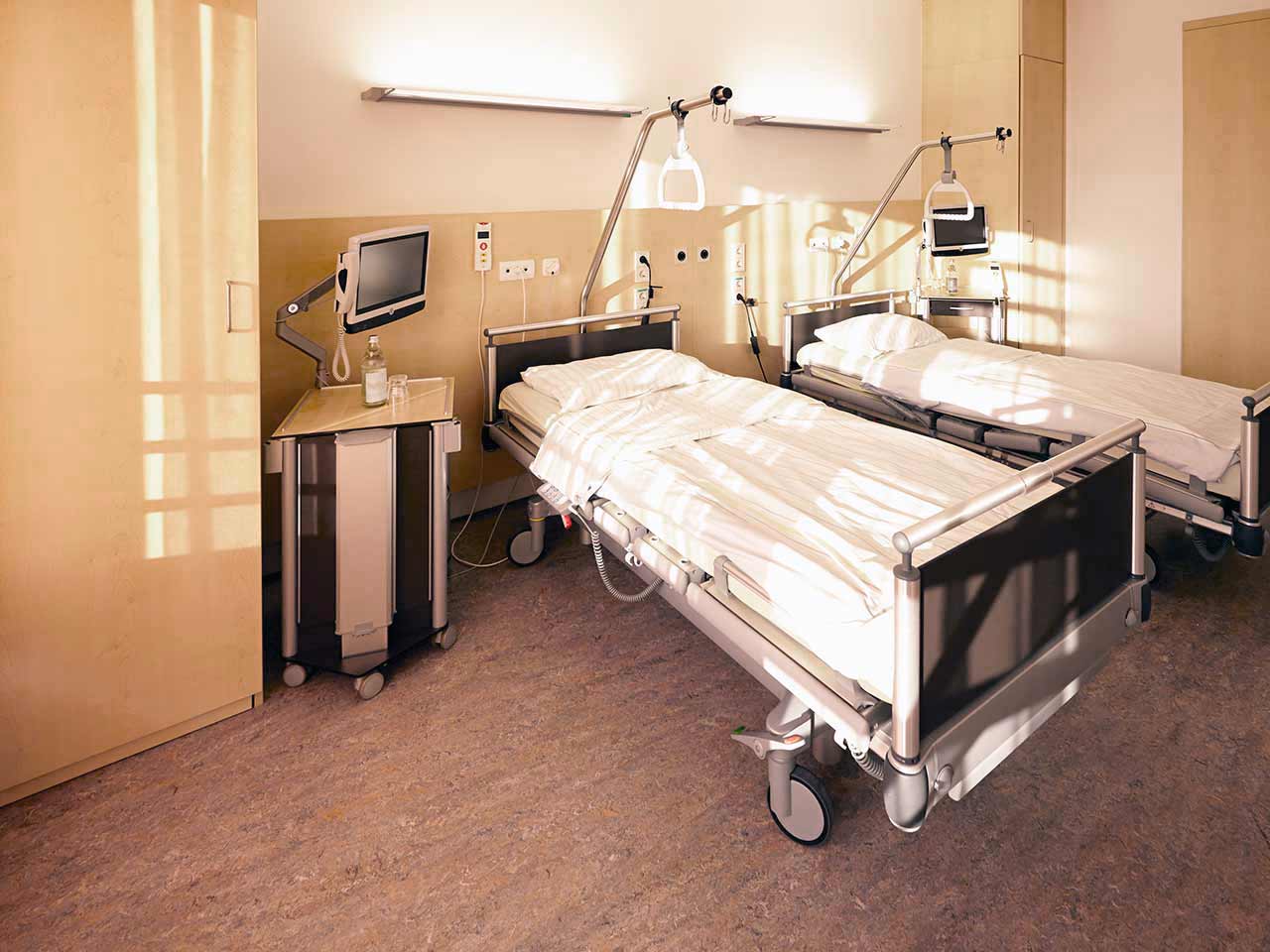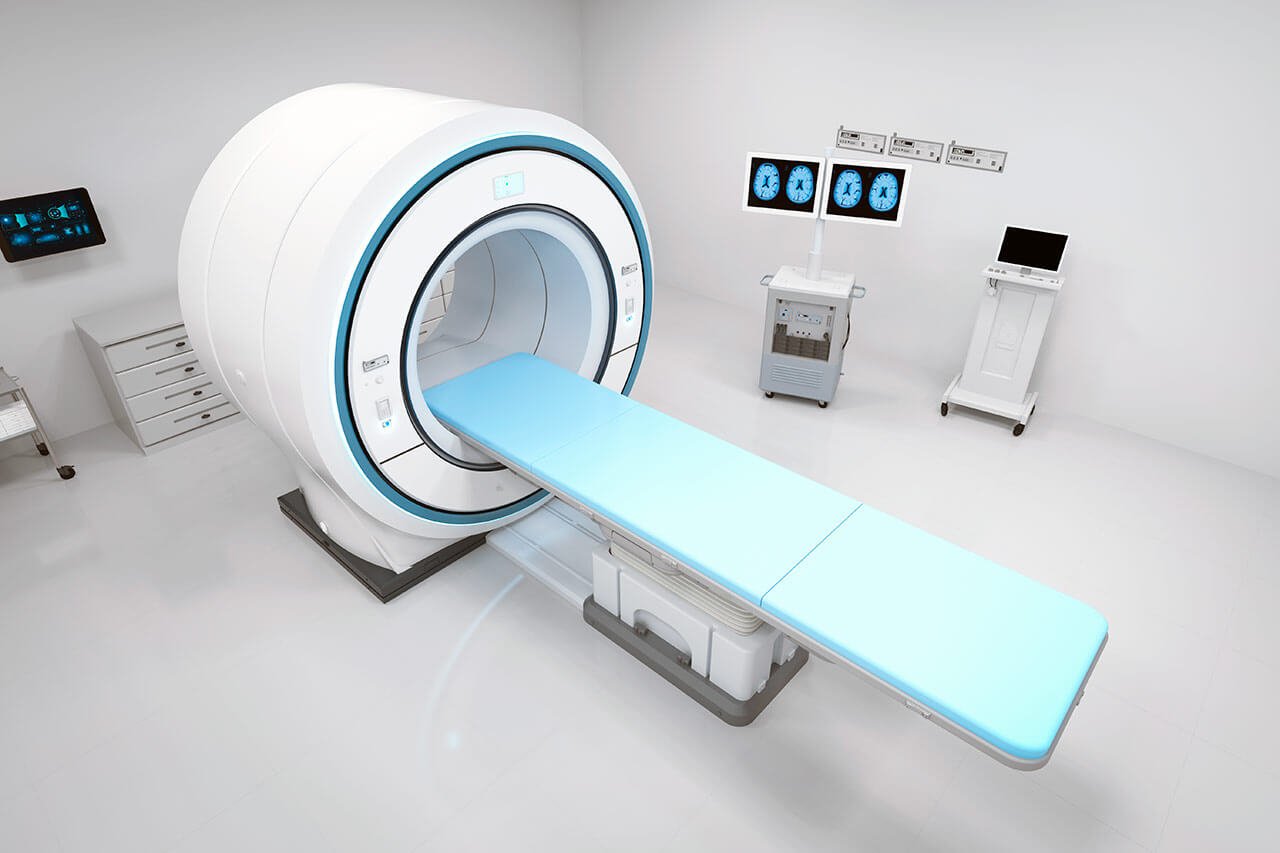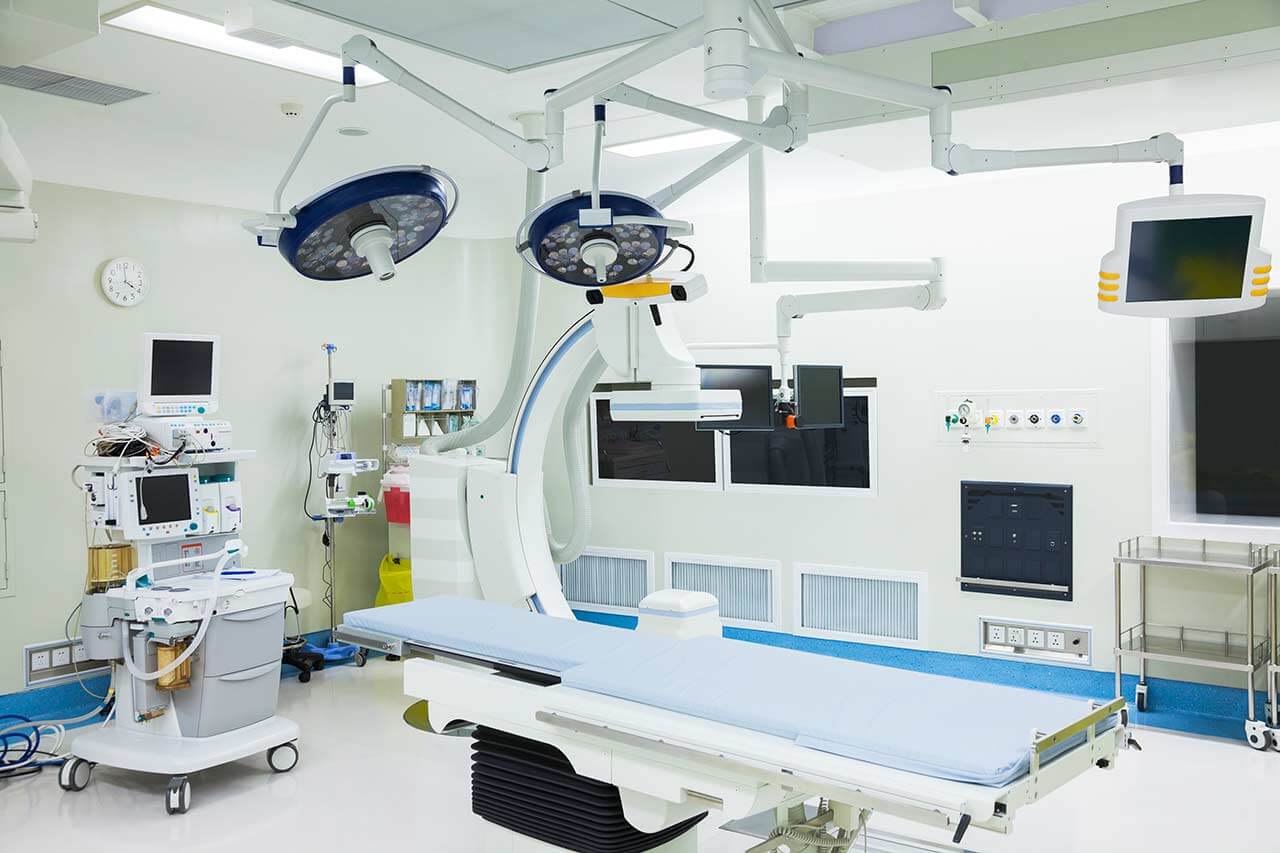
The program includes:
- Initial presentation in the clinic
- clinical history taking
- review of medical records
- physical examination
- laboratory tests:
- complete blood count
- general urine analysis
- biochemical analysis of blood
- TSH-basal, fT3, fT4
- tumor markers
- inflammation indicators (CRP, ESR)
- indicators of blood coagulation
- abdominal ultrasound scan
- CT scan/MRI or PET-CT of abdomen
- preoperative care
- cytoreductive surgery to remove visible tumors
inside the abdomen and HIPEC - histological and immunohistochemical
examination of removed tissues - symptomatic treatment
- cost of essential medicines
- nursing services
- stay in the hospital with a full board
- accommodation in a 2-bedroom ward
- elaboration of further recommendations
How program is carried out
During the first visit, the physician will conduct a clinical examination and go through the results of the available diagnostic tests. After that, you will undergo the necessary additional examination, such as the assessment of liver and kidney function, ultrasound scan and tomography of the abdominal organs. Based on the results of the examination, the physician will choose the surgical technique and the type of anesthesia. After that, preparation according to the preoperative standard will start.
Cytoreductive surgery begins with general anesthesia. The intervention is performed as open surgery, i.e. through the incision in the anterior abdominal wall, so that the surgeon can carefully examine the peritoneum and the surface of the abdominal organs. The surgeon removes affected by the malignant process areas of the peritoneum and metastases in other internal organs. This stage of the operation can take several hours, since the overall effectiveness of the treatment depends on the completeness of the malignant tissues removal.
At the next stage of the operation, the surgeon inserts several catheters into the abdominal cavity. Through the catheters, a heated solution of a chemotherapy drug is pumped inside. The special system maintains the required temperature (42-43 degrees Celsius), pressure and circulation rate of the medicinal solution. The solution mechanically flushes out blood clots and remnants of malignant tissues, and a heated chemotherapy drug destroys micrometastases in internal organs and lymph nodes (micrometastases can’t be detected by the naked eye).
After 1-1.5 hours, the chemotherapy drug is removed from the abdominal cavity and the abdominal cavity is washed with saline. After that, the surgeon removes the catheters and sutures the incision of the anterior abdominal wall.
After the completion of the operation, you will be transferred to the ward of the intensive care unit, under the round-the-clock supervision of doctors and nurses. In 1-3 days after the operation, your drains will be removed and you will be transferred to a regular ward for further recovery. The whole treatment takes 10-12 days on average.
Finally, the attending physician will evaluate the results of control examinations, schedule the date of discharge from the hospital and give you detailed recommendations for further follow-up and treatment.
Required documents
- Medical records
- X-ray examination, MRI/CT scan (if available)
- Pleural biopsy (if available)
Service
You may also book:
 BookingHealth Price from:
BookingHealth Price from:
About the department
The Department of Thoracic Surgery at the ViDia Hospital Karlsruhe provides the full range of modern medical services for patients with benign and malignant diseases of the respiratory tract, lungs, mediastinum, and pleura, as well as chest wall deformities and injuries. Since 2011, the department has been certified by the German Cancer Society (DKG) as a Lung Cancer Center. Patients with this cancer are treated in close cooperation with pulmonologists, oncologists, and radiation therapists. Thoracic surgeons work in state-of-the-art operating rooms with advanced equipment adapted for effective and safe surgical treatment. More than 80% of surgical interventions performed in the medical facility are minimally invasive, so the risks to patients are virtually zero, and there is no need for a long-term hospital stay. If a patient needs extensive resection for a malignant lung tumor, surgeons perform an autologous lung tissue transplant, combining bronchoplasty and angioplasty techniques. Radiofrequency ablation is also successfully performed as an alternative to surgery for lung cancer and lung metastases. Many patients have fears and concerns before surgery, so doctors devote enough time to personal communication with each patient, showing a humane attitude and understanding. The Head Physician of the department is Prof. Dr. med. Thomas Schneider.
The main focus of the department's specialization is the treatment of lung cancer, which is the third most common malignant tumor among men and women. For the treatment of patients with this diagnosis, a specialized center has been operating in the department since 2012. The certification from the German Cancer Society (DKG) testifies to the successful clinical practice of the medical facility. The medical team of the center aims to provide patients with accurate diagnosis and effective treatment, as well as comprehensive care throughout the entire therapeutic process. Interdisciplinary tumor boards are held weekly in the Lung Cancer Center, where thoracic surgeons and physicians from related medical fields study the diagnostic results of patients and elaborate an effective treatment regimen. In most cases, the first-line treatment is surgical resection of the malignant tumor. The department's thoracic surgeons almost always perform surgical interventions using sparing video-assisted thoracoscopic surgical techniques (VATS). In some cases, patients also receive neoadjuvant chemotherapy or radiation therapy prior to surgical intervention to shrink the tumor size and thus ensure the best resection results. Radiation therapy, chemotherapy, immunotherapy, antibody therapy, and other conservative treatment methods are often indicated to the patient after surgery.
The department's thoracic surgeons also specialize in the treatment of lung metastases. For this purpose, doctors perform a modern procedure called radiofrequency ablation. The essence of this minimally invasive treatment method is the impact on the tumor tissue with high-energy radio waves. The therapeutic effect is achieved by heating atypical lung tissues to extremely high temperatures (90°C and above), resulting in the death of cancer cells. The therapeutic manipulation is performed under CT guidance. In some cases, radiofrequency ablation can be performed in the department not only to remove metastases but also to destroy small malignant lung tumors, no larger than 3-4 cm.
An integral part of the clinical activity of thoracic surgeons is the repair of chest deformities such as pectus excavatum and pectus carinatum. Chest deformities are a serious aesthetic problem, but they are also associated with damage to health because they often cause respiratory disorders, heart displacement, spinal curvature, and other pathologies. In cases of mild forms of pectus excavatum, doctors often perform Klobe vacuum bell therapy. The disadvantage of this treatment option is its long-term application – 2-3 years or more. The most effective method of repairing pectus excavatum is the Nuss procedure. This intervention is performed at the medical facility using minimally invasive techniques. Thoracoplasty is the optimal treatment method for pectus carinatum.
The department's range of medical services includes:
- Surgical treatment of malignant diseases of the respiratory system
- Surgery for lung cancer and lung metastases
- Surgery for pleural mesothelioma
- Surgery for mediastinal cancer
- Surgery for malignant pleurisy
- Surgery for malignant chest wall tumors
- Surgical treatment of benign diseases of the respiratory system
- Surgery for chest deformities: pectus excavatum and pectus carinatum
- Surgery for pneumothorax
- Surgery for pleural empyema
- Other surgical options
Curriculum vitae
Higher Education and Professional Career
- 1986 - 1992 Medical studies, Justus Liebig University Giessen and Ruprecht Karl University of Heidelberg.
- 1994 Thesis defense: "Classification of breast tumors. Obtaining objective results using planned morphometry".
- 1999 Board certification in Surgery, University Hospital Heidelberg.
- 2002 Board certification in Thoracic Surgery, University Hospital Heidelberg.
- 2004 Senior Physician, Department of Thoracic Surgery, University Hospital Heidelberg.
- 2012 Head Physician, Department of Thoracic Surgery, ViDia Hospital Karlsruhe.
- 2014 Habilitation, Ruprecht Karl University of Heidelberg. Subject: "Induction of a characteristic tumor immune response by radiofrequency ablation in lung cancer".
- 2014 Visiting Professor (specialization: treatment of lung cancer and pleural mesothelioma), Memorial Sloan Kettering Cancer Center, New York, USA.
Clinical Interests
- Minimally invasive surgery on chest organs, excluding the heart.
- Surgical treatment of lung, pleural, and mediastinal tumors.
- Laser surgery for lung metastases.
- Surgical treatment of pulmonary emphysema.
- Surgical repair of pectus excavatum.
Photo of the doctor: (c) ViDia Kliniken Karlsruhe
About hospital
The ViDia Hospital Karlsruhe is a modern medical facility with a rich history and traditions. The medical complex is an academic hospital of the University of Freiburg, granting patients access to advanced university medicine and the very latest therapeutic developments. The hospital first opened its doors in 1851 and, since then, has maintained a leading position in the European medical arena. The health facility offers a state-of-the-art technical base, comfortable infrastructure, and highly qualified doctors. All this allows the hospital to provide patients with top-class healthcare in accordance with modern standards. In addition, the hospital's team honors Christian traditions, emphasizing a humane attitude towards the patient and striving to provide understanding and support.
The hospital employs a large team of specialists, consisting of over 3,200 staff members, including 400 highly qualified physicians. The medical team admits more than 50,000 inpatients every year, and about 100,000 patients are diagnosed and treated on an outpatient basis or in a day hospital. More than 3,000 babies are born in the maternity rooms of the Department of Obstetrics every year. More and more patients, including those from abroad, come to the hospital for medical care annually.
The hospital has 24 specialized departments with 25 highly certified, narrowly focused centers integrated into them. A large Cancer Center certified according to the German Cancer Society (DKG) standards also operates here. Thus, one of the main clinical focuses of the medical complex is cancer treatment. The hospital also excels in other specialties, such as general surgery, abdominal surgery, thoracic surgery, orthopedics, cardiology, endocrinology, otolaryngology, pulmonology, gastroenterology, and others. There are 37 operating rooms available here for surgical treatment, the equipment of which corresponds to the highest technical level. Priority is given to performing minimally traumatic operations using minimally invasive, endoscopic, arthroscopic, and endovascular techniques.
The ViDia Hospital Karlsruhe enjoys a high reputation in Germany and far beyond its borders. The health facility successfully combines innovative medicine with Christian values, thanks to which the patient receives not only effective treatment but also care, understanding, and support.
Photo: (с) depositphotos
Accommodation in hospital
Patients rooms
The patients of the ViDia Hospital Karlsruhe stay in comfortable single and double rooms with modern design. Each patient room has an ensuite bathroom with a shower and a toilet. The standard room furnishings include an automatically adjustable bed, a bedside table, a table and chairs, a wardrobe, a telephone, a TV, and a radio. Wi-Fi access is also available in the patient rooms.
Patients can also be accommodated in enhanced comfort rooms. These rooms are very spacious and are additionally equipped with a safe, a mini-fridge, and upholstered furniture.
Meals and Menus
The patients of the hospital are offered three tasty meals a day: breakfast is served buffet-style, and there are several set menus to choose from for lunch and dinner.
If, for some reason, you do not eat all of the foods, you will be offered an individual menu. Please inform the medical staff about your dietary preferences prior to treatment.
Further details
Standard rooms include:
![]() Toilet
Toilet
![]() Shower
Shower
![]() Wi-Fi
Wi-Fi
![]() TV
TV
Religion
There are several chapels on the territory of the hospital. Regular Catholic and evangelical services are held here. Patients can also visit one of the chapels at any time to find a quiet place to pray, if desired.
Accompanying person
Your accompanying person may stay with you in your patient room or at the hotel of your choice during the inpatient program.
Hotel
You may stay at the hotel of your choice during the outpatient program. Our managers will support you for selecting the best option.





